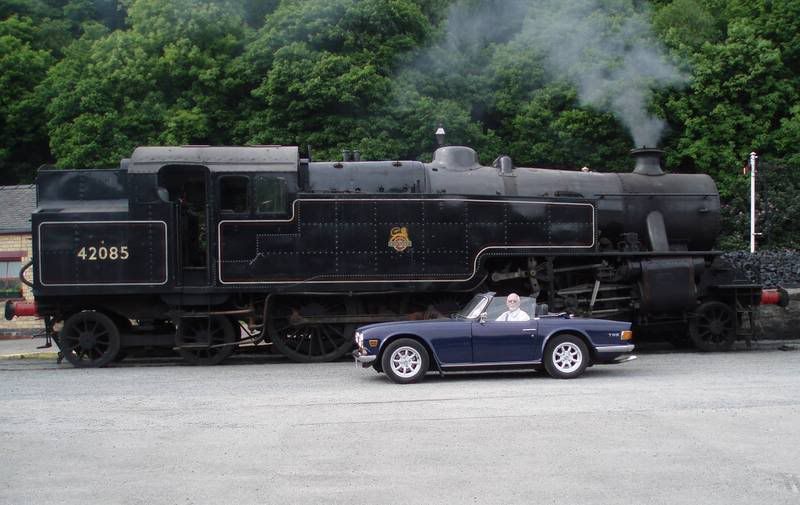klank
Involved Member
   Robinson's Locos - Edwardian elegance at its best.
Robinson's Locos - Edwardian elegance at its best.
Posts: 87
|
Post by klank on Jul 27, 2008 22:13:12 GMT
This may be a dumb question, but I have been looking at all manner of plans and drawings of stationary boilers, and the type of screw thread used for fittings is confusing.
In all of the plans - both in books (Tubal Cain/Harold Hall etc.) and published articles in various magazines - boiler "blanking plugs" for want of a better word are drilled and tapped for fittings - gauge glass, valves, filler, clack, throttle etc. before silver soldering to the barrel/manifold or whatever.
These items can be purchaced ready made from various sources or fabricated in the workshop.
Being a novice, I like to follow a plan/recipie - comfort zone for success.
The screw threads specified for these plugs are usually at 40t.p.i. or 32 t.p.i. (although Harold Hall also mentions plain metric!).
Is there any accepted thread - what is best practice and is there a reason for this disparity?
I do not have a full range of both 40 and 32 t.p.i. taps and dies and I am also confused when one plan says use 40 for a particular fitting and another says 32 for the same thing.
Secondly, when making up the screwed joint between a fitting and threaded boiler plug - should the thread be sealed somehow?
I.E. - does one wrap a bit of p.t.f.e. tape around the thread, and should a washer (fibre/crush copper or something else) be used?
I have read Tel's earlier posts/advice on making nipples for pipe joints - seems clear enough, but it is the threads which are confusing - and no mention of sealing washers.
Can anyone help please?
|
|
|
|
Post by baggo on Jul 28, 2008 0:04:59 GMT
Hi Klank,
I think what you are referring to are boiler bushes rather than blanking plugs. The blanking plugs are readily available but are usually meant for screwing into the boiler bushes to 'blank' them off when doing a boiler test. I've never seen the actual boiler bushes for sale, although that doesn't mean they aren't. If you make your own, the standard practice is to just start a taper tap into the threaded bore before soldering them into the boiler and finish the thread all the way through after soldering. If you tap the thread all the way through before soldering, there is a danger of burning the delicate threads during the soldering process.
The most common threads for boiler fittings are the ME threads and for the smaller fittings, say up to 5/16" dia., are usually 40tpi. Larger fittings such as 3/8" diameter safety valves tend to be 32tpi.
You do need to use some sort of seal on the fittings, whether it be a jointing compound or copper washers. PTFE tape works fine on threaded fittings but you need to be careful that you don't get loose strands floating around in the boiler waiting to block something up. If you use it, don't run the tape right to the very end of the thread.
Perhaps a better alternative, although I've never used it, is something like Loctite 290 which is a thread locker/sealer which will stand boiler temperatures.
I use a couple of Rocol jointing compounds, PipeSeal which is a liquid PTFE (but V. expensive!) and OilSeal which is quite a bit cheaper. I've tried Foliac in the past but found it to be neither use nor ornament!
John
|
|
|
|
Post by circlip on Jul 28, 2008 8:35:53 GMT
If making your own fittings Klank, choose to suit yerself, but if buying, it's already been decided for you. And a SERIOUS note of warning, if you go down the road to them sellers that have now moved to Torquay, be aware that they have special magnets built into the displays that are capable of automatically extracting both coinage AND paper money in a blink. No connection, but worth a visit cos they have more on show than on the web site.
Sealing? Great believer in annealed copper washers.
Regards Ian.
|
|
|
|
Post by Tel on Jul 28, 2008 9:25:40 GMT
I find the making of fittings one of the most enjoyable aspects of this hobby. I use the ME series thread - 40 tpi up to 9/32", then 32 tpi from 5/16" to 3/8" - above that (up to 3/4") I use the 26 tpi BSB series.
|
|
|
|
Post by ron on Jul 28, 2008 9:37:01 GMT
One thing to watch, if you are dealing with boilers for stationary engines Stuart Turner tend to use a coarser thread than most, ie where most people would take Tel's sizes as the norm they use 32 tpi where others use 40 and 26 tpi where others use 32, basically if you are intending using ST stuff it might be as well to conform to their system.
Ron
|
|
klank
Involved Member
   Robinson's Locos - Edwardian elegance at its best.
Robinson's Locos - Edwardian elegance at its best.
Posts: 87
|
Post by klank on Jul 28, 2008 11:55:52 GMT
Thank you all for the most useful comments and advice.
I understand the threads now.
Yes, John, - I meant to use the word "Bush" but couldn't think of it - mind in neutral.
Got to get some copper washers.
Ian, in so far as taps/dies go - I assume one can use "carbon steel" items rather than pay a huge amount more for HSS - since they will only be used on non-ferrous material?
If I use the "Torquay" option, at least sets of taps/dies are easy to smuggle into the workshop past the eyes of s.w.m.b.o. - just use the usual excuse - "It was a special bargain".
Tel - you are absolutely right - I'm making a little throttle/lubricator fixture from TC's book and next is a pump from the plans you sent - its very rewarding and relaxing work.
|
|
|
|
Post by ron on Jul 28, 2008 12:23:34 GMT
Hi
Others might disagree but I only buy carbon steel taps and dies, nowadays reasonable quality ones are available dirt cheap from numerous suppliers, I don't think for our purposes HSS is worth the extra unless you intend doing a lot of threading on harder steels. On brass, gunmetal etc they will almost last forever unless you break them.
Ron.
Ron
|
|
|
|
Post by Tel on Jul 29, 2008 20:18:31 GMT
........... AND they give you a cleaner cut.
|
|
|
|
Post by circlip on Jul 31, 2008 7:28:19 GMT
Got some HSS taps and dies in various when I were an apprentice and used to have some given to "Try out" later. Had to attend one of sons passing out parades at "Britannia" and them tool people were at the bottom of the hill at that time so all the ME bits I got were carbon and as you say fine for non ferrous, that's when I found out about the "magnets".
Regards Ian.
PS. I waved on the way past going to Plymouth on Wednesday but you must have been looking the other way ;D
|
|
|
|
Post by dickdastardly40 on Jul 31, 2008 8:31:33 GMT
them tool people were at the bottom of the hill at that time Them tool people are still there (though not necessarily in the same place). Any excuse for me to go to Dartmouth & inspect a boat out of refit at VT Sand Quay just so I can wander round their shop. |
|
klank
Involved Member
   Robinson's Locos - Edwardian elegance at its best.
Robinson's Locos - Edwardian elegance at its best.
Posts: 87
|
Post by klank on Jul 31, 2008 17:23:35 GMT
Well the magnet worked - very quickly - got the t&d's I was missing in carbon steel - not too pricy and service was excellent. (small package - easy to smuggle inside).
Ian, I try to stay off the A38/M5 for the next month or so - but next time wear a pink flower even if I miss you, its sure to attract some admiring glances I expect!.
If any of you ever fancy the new A30 bit to Honiton (classy road) - drop in for tea and jaffa cakes.
|
|
|
|
Post by Deleted on Aug 28, 2008 15:34:42 GMT
I've had to make a fair number of boiler bushes in my time and would recommend caution over the use of any thread finer than 32 tpi in copper alloys, particularly if there is likely to be a need to fit/remove fittings or blanking plugs a number of times. A stripped 40 tpi thread can be a bit of a nuisance.
Also, take care over the choice of material for the bushes. Never use brass. Our local water will take the zinc out of brass quicker than some tool suppliers can take money from your wallet. Some bronzes are also not too special when it comes to withstanding silver soldering temperatures as they contain alloying elements which facilitate extrusion.
Have always found that College Engineering Supplies will offer sound advice on the choice of materials for a particular task
|
|
klank
Involved Member
   Robinson's Locos - Edwardian elegance at its best.
Robinson's Locos - Edwardian elegance at its best.
Posts: 87
|
Post by klank on Aug 28, 2008 16:05:53 GMT
Ulster - thanks for the sound advice - I have used bronze for all of the bushes and gun metal for the filler plug column and dome cap.
Regards
Peter
|
|





